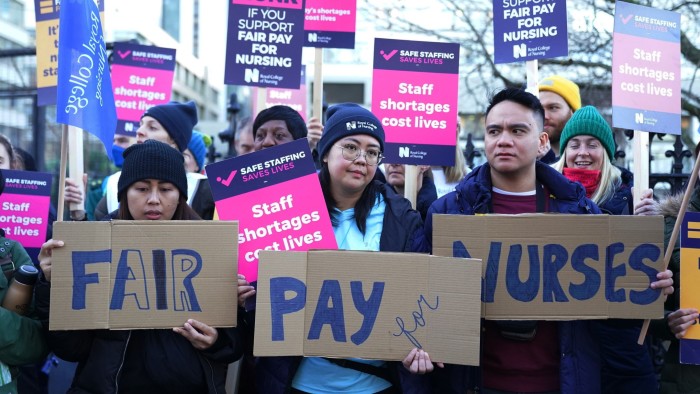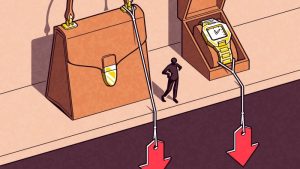UK ministers reject union calls to lift public sector pay to pre-austerity levels

Unlock the Editor’s Digest for free
Roula Khalaf, Editor of the FT, selects her favourite stories in this weekly newsletter.
UK ministers have rejected calls from unions to restore public sector pay to its pre-austerity level, saying real-terms increases in wages will be affordable only if they are underpinned by productivity gains.
Proposals to limit awards for teachers and NHS staff to 2.8 per cent next year drew an angry reaction from unions, which said the government was adding insult to injury by asking schools to fund the uplift from existing budgets, and hospitals to fund workforce reforms from the same pot.
But Downing Street said on Wednesday that any Whitehall departments wanting to pay more than 2.8 per cent in 2025-26 would have to fund it through increased productivity or greater efficiencies, in the context of a tough spending review where every line of their budget would come under scrutiny.
“It is vital that pay awards are fair for both the taxpayer and workers,” said Number 10. Echoing the hard line taken by the Treasury in evidence submitted to the independent pay review bodies on Tuesday, it added: “The chancellor has made very clear that . . . departments will have to live within their means. Real-terms pay increases are only sustainable if they are matched by productivity gains.”
The government’s position is a blow to unions’ hopes that a Labour administration would seek to reverse the pay decline many public sector workers have suffered since 2010 relative to private sector peers.
Rachel Reeves’ approval of pay rises of 5-6 per cent for much of the public sector for 2024-25 — and a 22 per cent uplift over two years for junior doctors — was seen by unions as the first step in a process of pay “restoration” to tackle endemic problems with recruitment and retention.
Paul Nowak, general secretary of the Trades Union Congress, said there were “real concerns across the trade union movement” about the government’s recommendation.
“We all know the pressure on public finances from the mess the Tories left things in. But . . . it’s hard to see how you address the crisis in our services without meaningful pay rises. And it’s hard to see how services cut to the bone . . . will find significant cash savings,” he said.
But the Treasury said in Tuesday’s evidence that workers with similar skills and experience could now earn “roughly the same across the public and private sectors”, even before factoring in the value of public sector pensions, which are often more generous.
Analysis of wage data by the finance ministry suggested that a “pay premium” of about 5 per cent in 2008-09 had evaporated, but that the latest pay increase meant there was no pay penalty, it added.
The Treasury also said public sector employers had found it easier to retain staff in recent months as the wider jobs market weakened, and employment growth was increasingly driven by government spending.
The proposed 2.8 per cent pay rise would be similar to wage settlements expected in the private sector, and would outpace inflation, on current forecasts, it noted.
But unions said many NHS workers would in practice receive a real-terms pay cut, because the government has said that delayed reforms to pay scales will have to be funded from the same pot.
A 6.7 per cent rise in the minimum wage will also mean wage rises need to be tilted towards the lowest paid.
“NHS staff will end up with less,” said Helga Pile, head of health at Unison, Britain’s biggest union, adding that the government had “broken a commitment” by delaying reforms to pay scales needed to reflect the responsibilities that staff in lower grades had taken on over time.
Problems with pay scales had led to “lots of local strikes” and the delay in tackling the anomalies meant “there could well be more”, she warned.
Ministers are braced for the possibility of some unions balloting for industrial action next year in protest at the 2.8 per cent pay offer, notably the National Education Union, the biggest education union.
The NASUWT teaching union also said the government would face “industrial relations misery” for the new year if it persisted on this path.
Ben Zaranko, associate director at the Institute for Fiscal Studies think-tank, said decisions on public sector pay would become “even more contentious” in the following year, as departmental budgets would be growing at a much slower pace and “the ‘affordability’ constraint will bite even harder”.
#ministers #reject #union #calls #lift #public #sector #pay #preausterity #levels




